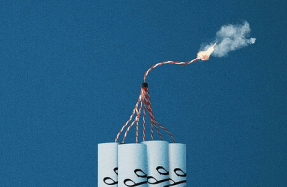Shape Shifter

Kyrsten Sinema wasn’t the only Democrat to vote against including a $15 federal minimum wage in the $1.9 trillion COVID relief bill in early March, but she was the only one whose vote became a meme. The clip itself is short and sparse: Sinema, the 44-year-old first-term Democratic senator from Arizona, walks briskly around the well of the chamber, gives Mitch McConnell a friendly pat on the back, and pauses in front of the clerk. Then she thrusts her right thumb dramatically down, dipping her body for emphasis.
“Ms. Sinema. Ms. Sinema: No,” says the clerk, recording her vote. But Sinema, by this point, is already gone.
That morning, she had brought a chocolate cake for the floor staff who worked long hours before the final stimulus vote. Now “Marie Antoinette” was trending on Twitter. Within a few hours, the image was everywhere—on cable news, late-night shows, even the side of an old flour mill in downtown Tempe, near the intersection where, in 2003, Sinema led an anti-war vigil on the eve of the invasion of Iraq. “Keep the cake,” read the message projected onto the building. “Support the $15 minimum wage now.”
To Sinema’s progressive critics, her vote was a funhouse mirror image of John McCain’s thumbs-down vote to save the Affordable Care Act four years earlier—only now an Arizona Democrat was rejecting one of her party’s biggest legislative priorities. More alarming was her opposition to reforming the filibuster, the Senate rule that allows a minority of senators to block a piece of legislation from coming to a vote. Weeks earlier, Sinema, who rarely speaks to reporters from news outlets that are not based in her home state, had drawn a sharp line during an interview with Politico: “I want to restore the 60-vote threshold for all elements of the Senate’s work,” she said. In the face of united Republican opposition, many Democrats feared such a standard would doom almost every piece of their agenda—from immigration reform to voting rights to LGBTQ equality.
Democrats expected such intransigence from West Virginia’s Joe Manchin, a conservative from a state Donald Trump carried by 39 points, who once shot climate legislation with a gun and whose wife cuts his hair with a Flowbee. But to those who have supported Sinema from the beginning of her career, her heel-turn is more painful. Long before she became one of the Democratic caucus’s most centrist members, Sinema was so liberal she refused to even join the party. From her family’s struggle with poverty during her childhood to her Green Party roots, her rise is the story of striving and adaptation, and of the transformation not just of an idealist, but of a state—from a Republican stronghold she once dubbed the “meth lab of democracy” to a bona fide battleground.

But in the process, Sinema has left some back home wondering whether she’s misread the lessons of her own ascent. As a progressive in one of the nation’s most conservative state legislatures, Sinema abandoned her early radicalism for a new theory of change. She learned to play nice, seeking incremental progress through careful messaging and across-the-aisle relationships, and reinventing herself as a post-partisan deal-maker. But her success was also powered by an army of activists—outsiders like she had once been—operating on a far different theory of change. Now, for the first time in her career, she holds real power. The future of the party and the Senate just might hinge on what Kyrsten Sinema wants to do with it.
to explain why she opposed the minimum-wage hike, she began, as she often does, with a nod to her past. “I understand what it is like to face tough choices while working to meet your family’s most basic needs,” she said in a statement. While critics called her a hypocrite and pointed to comments in which she had previously endorsed a higher wage, Sinema insisted she still support an increase. Her issue, she said, was that the wage increase had nothing to do with
You’re reading a preview, subscribe to read more.
Start your free 30 days





